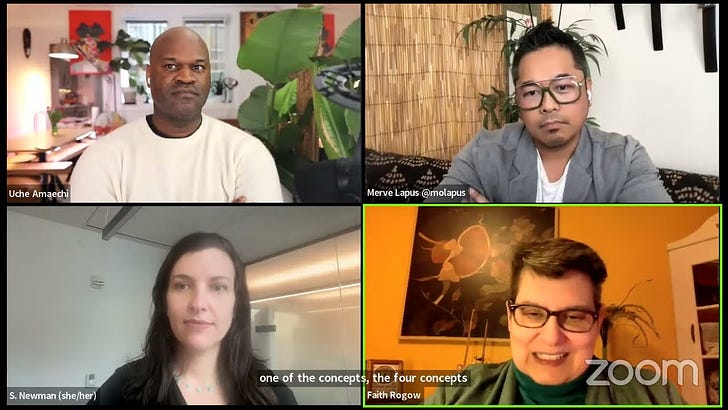The AI Pedagogy Project
An excellent resource from metaLAB and Berkman Klein Center for Internet & Society at Harvard University
“We are at an inflection point in the development of AI tools—who will decide what capabilities are developed, by whom, and to what end?
We believe it is crucial for all educators, including those in non-technical fields, to contribute to these conversations—to surface questions about what it means to be human, to bring critical and historical perspectives to AI, and to revisit the goals of education, now, and in the future.”
I attended the Media Literacy Education and AI webinar, hosted by Uche Amaechi and the Harvard Graduate School of Education on Wednesday. Guests were Merve Lapus, vice president, Education Outreach & Engagement, Common Sense Education, Sarah Newman, director of art and education, metaLAB (at) Harvard, Berkman Klein Center for Internet & Society at Harvard University, and Faith Rogow, author, Media Literacy for Young Children: Teaching Beyond the Screen Time Debates.
Here’s how HGSE summed up the key takeaways:
It is never too soon and never too late to empower students to think critically and creatively, not cynically, about generative AI and all media. An inquiry mindset is a good entry point.
Teach students the habit of asking inquiry-based critical thinking questions and remind them that all media are created and what is included and excluded influences the messages that are conveyed.
Don’t give AI too much power. Everyone, including educators, should actively question the role they want new technologies to have in our lives, including our schools, colleges, and universities.
My personal key takeaway was learning about The AI Pedagogy Project, created by the metaLAB (at) Harvard within the Berkman Klein Center for Internet & Society. Here are a few of the questions they ask:
How do we make informed, intentional decisions about the role of AI in the classroom? How can students develop critical relationships with these tools? How can imaginative applications of AI technologies enhance learning? The AI Pedagogy Project helps educators engage their students in conversations about the capabilities and limitations of AI informed by hands-on experimentation.
Explore their AI Guide here, and check out their Assignments, “an evolving collection of curated assignments that integrate AI tools from educators around the world.” My personal favorite so far is this one: Correct a Bad Essay—Practice editing skills and learn about LLMs by generating a poorly written essay and then copy editing it with annotation and reasoning. Sarah Newman, the Project lead, and one of the 3 webinar guests, is the creator.
You can watch the webinar on the HGSE site or right here.
From the MDL Archives
I’ve been recommending and sharing resources created at Berkman Klein Center for several years now. Here’s an excerpt from a post, Big Blue Mind, that I wrote in June, 2019.
What I’m reading:
“Youth and Artificial Intelligence: Where We Stand”
I really appreciate the work of the Berkman Klein Center for Internet & Society at Harvard. I first encountered them when I was working on international education projects in the immersive web with Linden Lab. The Berkman Klein Center (at the time in 2008, it was just Berkman Center) was doing very innovative work holding classes in the immersive world of Second Life. When they created the Digital Literacy Toolkit, I contributed to the peer review.
Here’s their overview:
“This spotlight seeks to share Youth and Media’s initial learnings and key questions around the intersection between artificial intelligence (AI) and youth (ages 12-18), in the context of domains such as education, health and well-being, and the future of work. It aims to encourage various stakeholders — including policymakers, educators, and parents and caregivers — to consider how we can empower young people to meaningfully interact with AI-based technologies to promote and bolster learning, creative expression, and well-being, while also addressing key challenges and concerns.”
WANT MORE?
The posts, #GetMoreMeta, and Let’s talk with young people about AI, both from 2019, provide more still-relevant resources from the Berkman Klein Center.
Thanks so much for reading. Be well. And please consider sharing this post with family, friends, teachers, and/or colleagues who might appreciate it and put it to work.


